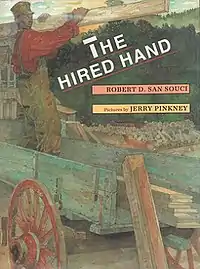The Hired Hand: An African-American Folktale
The Hired Hand: An African-American Folktale is a 1997 book by Robert D. San Souci and illustrator Jerry Pinkney based on an African American folktale about an itinerant worker who is able to rejuvenate and resurrect people.
 | |
| Author | Robert D. San Souci |
|---|---|
| Illustrator | Jerry Pinkney |
| Country | USA |
| Language | English |
| Genre | Children's literature, picture book, African-American folktales |
| Published | 1997 (Dial Books for Young Readers) |
| Media type | Print (hardback) |
| Pages | 40 (unpaginated) |
| ISBN | 9780803712966 |
| OCLC | 29258986 |
Reception
A review of The Hired Hand by Booklist wrote "He [Pinkney] successfully blends historically realistic details with timeless folkloric magic, and he enhances San Souci's smooth retelling in the process. An obvious choice for primary story hours, this will also make a welcome addition to African American folklore and history units.".[1]
The Hired Hand has also been reviewed by Publishers Weekly,[2] Kirkus Reviews,[3] School Library Journal,[4] and The Horn Book Magazine.[5]
Awards
- 1997 Aesop Prize - winner[6]
- 1997 CCBC Choice[7]
- 1997 Commonwealth Club of California Book Award: Juvenile - Silver[8]
- 1997 New York Times Best Illustrated Books[9]
References
- "The hired hand : an African-American folktale". Buffalo and Erie County Public Library. Retrieved February 17, 2017.
- "The Hired Hand: An African-American Folktale (starred review)". Publishers Weekly. PWxyz LLC. April 28, 1997. Retrieved February 17, 2017.
Shivery and superbly crafted.
- "The Hired Hand: An African-American Folktale". Kirkus Reviews. Kirkus Media LLC. May 20, 2010. Retrieved February 17, 2017.
What begins as a gripping, well-told tale starts to sound like a morality play, as Young Sam repents his lazy ways. .. Pinkney works his magic by blending both character and drama with the hushed tones of history.
- "The Hired Hand". kcls.bibliocommons.com. Retrieved February 17, 2017.
San Souci makes a choice in favor of "softening the heavy use of dialect," found in the original tale. Pinkney adopts a corresponding tone in his illustrations, polishing any harshness away.
- "The Hired Hand: An African-American Folktale: Reviews". catalog.wccls.org. Retrieved February 17, 2017.
The illustrations, as explained in the artist's note, extend the African-American folkloric tradition, setting the plot in a particular time and place (a colonial-era village where free blacks were a significant part of the community) without sacrificing the sense of magic and wonder.
- "Aesop Prize and Aesop Accolades". afsnet.org. American Folklore Society. Retrieved February 17, 2017.
- Kathleen T. Horning, Ginny Moore Kruse, Megan Schliesman (1998). CCBC Choices 1997: Folklore, Mythology and Traditional Literature (PDF). Friends of the CCBC Inc. p. 22. Retrieved March 20, 2017.CS1 maint: uses authors parameter (link)
- "California Book Awards". commonwealthclub.org. Commonwealth Club of California. Retrieved February 17, 2017.
- "Children's Books; Best Illustrated Books 1997". November 16, 1997. Retrieved February 17, 2017.
This article is issued from Wikipedia. The text is licensed under Creative Commons - Attribution - Sharealike. Additional terms may apply for the media files.